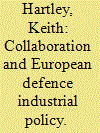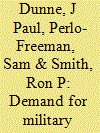| Srl | Item |
| 1 |
ID:
083243


|
|
|
|
|
| Publication |
2008.
|
| Summary/Abstract |
Traditionally, the EU has protected its national defence industries (through Article 296). There are now policy initiatives to create a European defence equipment market (EDEM) and a European defence technology and industrial base (EDTIB). This article assesses these policy initiatives. It considers the EU as an inefficient defence market and also considers the opportunities for creating an efficient defence industrial policy. Collaboration has been a distinctive feature of European defence industrial policy and a case study of the Typhoon is presented and assessed. Finally, criteria for assessing the strengths and weaknesses of the EDTIB are presented.
|
|
|
|
|
|
|
|
|
|
|
|
|
|
|
|
| 2 |
ID:
083241


|
|
|
|
|
| Publication |
2008.
|
| Summary/Abstract |
In recent years, there has been a growing number of studies that investigate the economic effects of military spending using a variety of estimation methods and focusing either on individual countries or on groups of relatively homogeneous countries. The situation is not the same as far as the demand for military expenditure is concerned, where less attention has been given and the majority of empirical studies have focused on individual countries, with only a few focusing on groups of countries and employing cross-sectional or panel data approaches. A region that has not attracted any research interest regarding the determinants of military expenditure is the European Union (EU) with the exception of individual country studies (mainly for the UK, Greece, France, Spain, Portugal). This paper argues that understanding the determinants of military spending in these countries is very important, especially given the discussions in recent years towards the development of a Common European Security and Defence Policy (CESDP). It then follows Dunne et al. (2003) and employs the Autoregressive Distributed Lag (ARDL) approach to cointegration to estimate a general model of aggregate defence spending for each of the 15 core EU countries over the period 1961-2005. The findings indicate that there is very little uniformity in the factors that determine each country's demand for military expenditure, something that needs to be borne in mind by policy makers when burden-sharing issues are considered in the development of the CESDP.
|
|
|
|
|
|
|
|
|
|
|
|
|
|
|
|
| 3 |
ID:
083242


|
|
|
|
|
| Publication |
2008.
|
| Summary/Abstract |
This paper considers the interpretation of the empirical results of the developing literature on the demand for military spending that specifies a general model with arms race and spill-over effects and estimates it on cross-section and panel data. It questions whether it is meaningful to talk of an 'arms race' in panel data or cross-section data, and suggests that it may be more appropriate to talk about the relevant variables - aggregate military spending of the 'Security Web' (i.e. all neighbours and other security-influencing powers) and the aggregate military spending of 'Potential Enemies' - as acting as proxies for threat perceptions, which will reflect both hostility and capability.
|
|
|
|
|
|
|
|
|
|
|
|
|
|
|
|
| 4 |
ID:
083239


|
|
|
|
|
| Publication |
2008.
|
| Summary/Abstract |
The move towards a common European defence policy raises a multitude of multidimensional and complex issues. As pointed out in a recent paper (Hartley, 2003), these issues include economic aspects ranging from the role of the European defence industrial base to the costs of a common defence policy, and therefore the issue of burden sharing. This paper, assuming that the provision of common European defence to the participating members has the characteristics of a pure public good, approaches the burden sharing issue raised by Hartley (2003) by calculating a simple benefit share index that is then compared with the contribution made by each country to the costs of the common defence. Assuming the existence of a European Defence Union, the results indicate that some members are under-contributing while others are over-contributing in relation to the benefits derived.
|
|
|
|
|
|
|
|
|
|
|
|
|
|
|
|
| 5 |
ID:
083240


|
|
|
|
|
| Publication |
2008.
|
| Summary/Abstract |
This paper focuses on the influence of military spending on European economic growth. The estimated regressions are based on Barro's (1991) growth model, which controls for economic institutional variation across countries. The cross-section and panel data analyses cover the period 1960-2000. The empirical findings indicate that military spending has an overall net negative influence on economic growth. Furthermore, the magnitude of this negative impact tends to increase over time, as cross-section regression results indicate. Given the development of a Common European Security and Defence Policy (CESDP), these findings suggest that enhanced defence spending may hinder European economic growth.
|
|
|
|
|
|
|
|
|
|
|
|
|
|
|
|